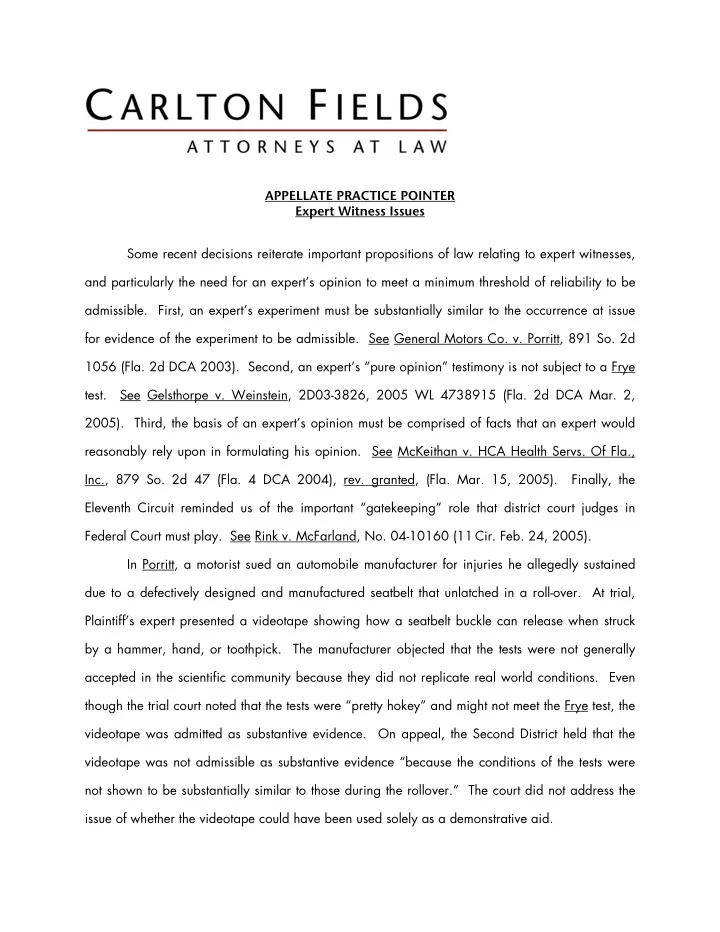

APPELLATE PRACTICE POINTER Expert Witness Issues Some recent decisions reiterate important propositions of law relating to expert witnesses, and particularly the need for an expert’s opinion to meet a minimum threshold of reliability to be admissible. First, an expert’s experiment must be substantially similar to the occurrence at issue for evidence of the experiment to be admissible. See General Motors Co. v. Porritt, 891 So. 2d 1056 (Fla. 2d DCA 2003). Second, an expert’s “pure opinion” testimony is not subject to a Frye test. See Gelsthorpe v. Weinstein, 2D03-3826, 2005 WL 4738915 (Fla. 2d DCA Mar. 2, 2005). Third, the basis of an expert’s opinion must be comprised of facts that an expert would reasonably rely upon in formulating his opinion. See McKeithan v. HCA Health Servs. Of Fla., Inc., 879 So. 2d 47 (Fla. 4 DCA 2004), rev. granted, (Fla. Mar. 15, 2005). Finally, the Eleventh Circuit reminded us of the important “gatekeeping” role that district court judges in Federal Court must play. See Rink v. McFarland, No. 04-10160 (11 Cir. Feb. 24, 2005). In Porritt, a motorist sued an automobile manufacturer for injuries he allegedly sustained due to a defectively designed and manufactured seatbelt that unlatched in a roll-over. At trial, Plaintiff’s expert presented a videotape showing how a seatbelt buckle can release when struck by a hammer, hand, or toothpick. The manufacturer objected that the tests were not generally accepted in the scientific community because they did not replicate real world conditions. Even though the trial court noted that the tests were “pretty hokey” and might not meet the Frye test, the videotape was admitted as substantive evidence. On appeal, the Second District held that the videotape was not admissible as substantive evidence “because the conditions of the tests were not shown to be substantially similar to those during the rollover.” The court did not address the issue of whether the videotape could have been used solely as a demonstrative aid.
In Gelsthorpe, the plaintiffs in a medical malpractice action appealed a summary judgment entered after the trial court excluded the plaintiffs’ sole expert witness on causation. The infant plaintiff was born with significant brain damage, allegedly due to the failure of the defendant physicians to perform a c-section. Plaintiff’s expert opined that, based on his clinical experience and training, the infant suffered his injuries due to a variety of other reasons. On appeal, the Second District held that the expert’s use of differential diagnosis, which drew on his experience and training, was “pure opinion” testimony and not subject to Frye scrutiny. In McKeithan, the Fourth District affirmed a trial court’s decision allowing an expert doctor in a medical malpractice case to offer a supplemental opinion where the opinion was based on the deposition of another doctor who testified at trial. The court reasoned that the opinions of the other doctor, a pediatric neuroradiologist, were of the type reasonably relied upon by a pediatric neurologist in giving an opinion. The Florida Supreme Court recently granted review of this decision. In Rink, the Eleventh Circuit applied federal law under Daubert v. Merrell Dow Pharmaceuticals, Inc., 509 U.S. 579 (1993), and affirmed the District Court’s exclusion of an expert witness and summary judgment in favor of a pesticide manufacturer in a product liability lawsuit. The plaintiffs had sued the manufacturer of a pesticide that allegedly contained a virulent substance to which the plaintiffs were exposed. Plaintiffs’ expert opined that the pesticide became dangerous because it was stored in high temperature facilities. The expert had no experience with the substance prior to being retained as an expert. The expert did not consider the testimony of workers at the storage locations and in reaching his conclusions he used data in reports that were deemed to be unreliable. Most importantly, the expert used an unreliable and untested methodology for determining the temperature of the pesticide storage areas. There was no evidence that the expert’s methodology was tested, subjected to peer review, or generally accepted. Accordingly, the trial court excluded the expert and all toxicologists (since the toxicologists relied on the expert’s conclusions in reaching their own). Without a toxicologist
establishing causation, the plaintiffs’ case could not proceed and the District Court entered summary judgment. The Eleventh Circuit affirmed in a detailed opinion that describes the trial court’s ”gatekeeper” role and the specific methodology used by the expert in Rink. For more information, please contact Al Saikali at 305.539.7375 or visit www.carltonfields.com. This publication is not intended as, and does not represent, legal advice and should not be relied upon to take the place of such advice. Since factual situations will vary, please feel free to contact a member of the firm for specific interpretation and advice, if you have a question regarding the impact of the information contained herein. The hiring of a lawyer is an important decision that should not be based solely upon advertisements. Before you decide, ask us to send you free written information about our qualifications and experience.
Recommend
More recommend